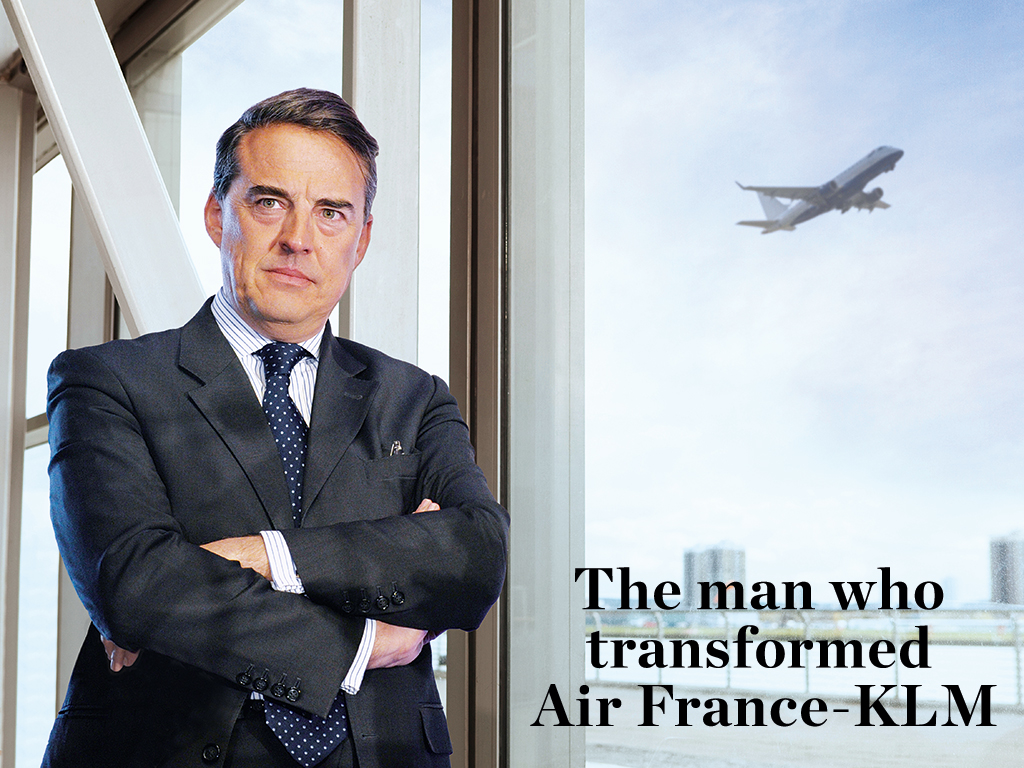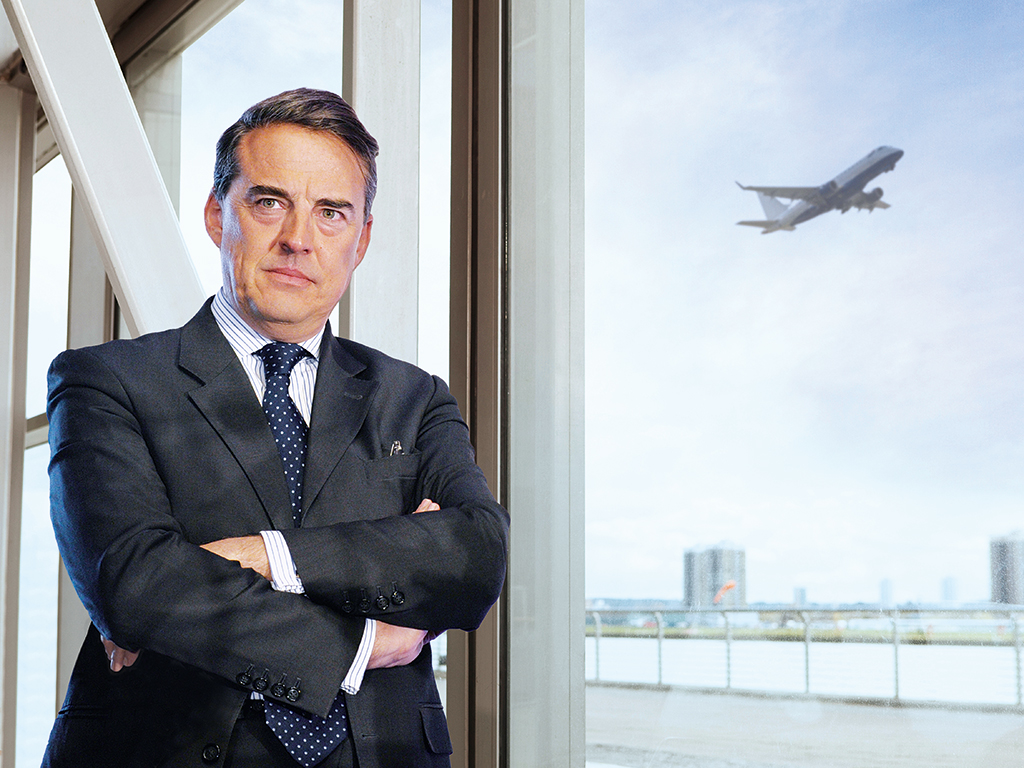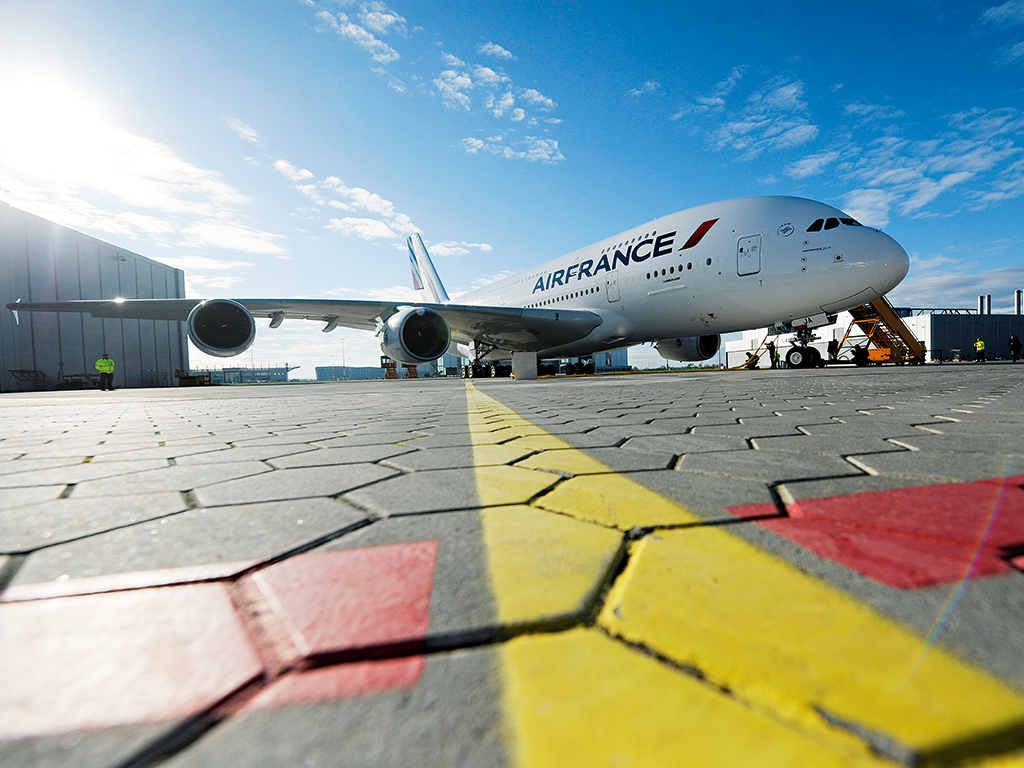

Nothing, it seemed, was going right for Air France-KLM in the last few months of 2011. Unions, and the pilots in particular, were in protest over prospective job cuts. Indeed, it was said the latter used to stop their aircraft on the tarmac outside the offices of outgoing CEO Pierre-Henri Gourgeon at Charles de Gaulle airport, purely as a gesture of defiance.
Financially, Air France-KLM was in a tail spin, haemorrhaging cash and passengers simultaneously. The airline had posted four years of increasingly heavy losses, was burdened by an enormous workforce, and was being dragged down by a crippling high-cost base that made it highly vulnerable to low-cost competitors. Europe’s second-biggest airline after Lufthansa, the French-Dutch partnership formed in 2004, but had failed to bounce back from the financial crisis as quickly as the German carrier and other rivals such as British Airways.
“The prospects of Air France are deeply eroded,” wrote a commentator in Le Parisien at the time (the French media typically use Air France when referring to the company as a whole). “It is attacked by the low-costs, the power of the Gulf airlines and the inroads made by Asian fleets.” None of these threats were exactly new – Air France in particular had faced all three for an entire decade, without making any progress.
Taking command
Alexandre de Juniac was appointed CEO of Air France in October 2011, but only really got going in early 2012.
However, his job from the start was to take over the reins of both airlines, Air France and KLM, the former being the dominant partner. The CEO appointment was only an interim one intended to lead to his full accession as leader of Air France-KLM in 2013.
In the meantime, ex-CEO Jean-Cyril de Spinetta came back in a caretaker role as chairman/CEO of the combined airline, while de Juniac got his feet under the desk. For all intents and purposes de Juniac was in charge.
In 2013 Spinetta stepped down and de Juniac was formally appointed CEO of the group.
Questionable credentials
Faced with the possibility of the collapse of a national icon, the government of president Nicolas Sarkozy handed the mission of rescuing the airline to an unlikely candidate. In early 2012 a civil servant with no experience of running an airline – or indeed any serious involvement with one – was passed the baton. His credentials were considered so poor that the then chairman (and former CEO) of Air France, Jean-Cyril de Spinetta, was adamantly opposed to the appointment. The government had to override his objections.
And so, Alexandre de Juniac, scion of a noble family and of France’s political elite, was effectively given the baton after being formally appointed in late 2011. “Parachuted to the top of a company on the verge of a nervous breakdown, the high-level civil servant inherits a perilous mission,” warned Le Parisien. The new appointee’s marching orders were clear – save the French-Dutch airline before it’s too late.
In fact it nearly was too late. In the 2009-10 financial year, the airline had posted an unprecedented loss of €1.55bn in the wake of the financial crisis. Composed of €1.29bn in operating losses and the rest in restructuring costs, the financial deterioration of the airline was clearly unsustainable. To make matters worse, an Air France plane crashed into the Atlantic with the loss of all 228 people on board.
Just before he handed over the baton to de Juniac, Gourgeon described it as an “annus horribilis” – a horrible year for the company.
Gourgeon was one of the few who backed de Juniac, mainly for his ability to discuss issues in a fair, reasonable and persuasive way: “He doesn’t make the mistake of underestimating the importance of explaining things. The most difficult thing [at Air France] is to get the ship moving, not to have revolutionary ideas. Air France needs somebody who is able to enjoy difficult situations and is capable of talking, talking, talking.” But Gourgeon had effectively been evicted from his position and had little say.
Easy target
At first the airline’s 100,000 employees did not quite know what to make of their new CEO, who likes being addressed as ‘Adj’, short for his full name. With his family signet ring, shirts embroidered with his initials, ties decorated with aircraft, polka dot braces and – in media interviews – his habit of putting his feet up on the desk, de Juniac is the very personification of aristocracy, the son of a career ambassador and author, the Baron Gontran. “Certainly, Alexandre de Juniac makes an easy target”, wrote an interviewer in L’Expansion.
But those who had worked with de Juniac recognised a razor-sharp intellect that had landed him top jobs in big business and in government. At the early age of 18, he had been admitted to the elite École Polytechnique engineering school known familiarly as ‘X’, a cradle for top talent that rejoices under the motto of ‘For fatherland, science and glory’. After graduating, he had gone on to further studies at the equally elite ENA management school.
And even though he had never run an airline, Adj certainly knew how to navigate the corridors of power, an essential skill in a government-owned national champion, as the big state-run businesses are known. De Juniac’s last job before taking over at Air France proved as such – he was head of the cabinet of Christine Lagarde, then France’s minister for the economy, industry and employment.
However, de Juniac had also distinguished himself with one of the toughest jobs in commerce – the reconstruction of Thales, a flagship French company that manufactures electrical systems for the aerospace and transportation industries. A mirror image of the job he faced at Air France, Thales suffered under bloated overheads, excess staff, hefty losses and uncompetitive products. Within a couple of years de Juniac had fixed all four.
Inaugral battle
“I give [people] confidence”, he says simply. And somehow he had to do just that when, as a first measure, he set about implementing the departure of 5,000 salaried staff within less than two years, under a turnaround strategy dubbed ‘Transform’.
Paramount was the restoration of Air France-KLM’s competitivity – and particularly that of the French airline, something previous CEOs had promised to achieve but failed to do. Here, his experience at Thales served de Juniac well. Within a few weeks of his appointment he told unions they either adopted more productive working conditions or he would rip up all the social accords – deals on pay and conditions. To stiffen the unions’ backs, he had already ordered a wage freeze.
This was the first battle and he had to win it. To everybody’s surprise, there were no threats of strikes and negotiations proceeded without delay – “never before [had that happened] at Air France,” wrote L’Expansion. Ironically, in terms of relations with unions, de Juniac’s aristocratic background served him well. According to insiders, he is unfailingly calm even under the most extreme provocation. “He never shouts and, when somebody shouts at him, he refuses to answer,” said a former colleague.
He also has a reputation for telling things the way they are. “You must tell the truth, even if it’s not all the truth right away,” de Juniac said in the middle of these landmark negotiations. “And it’s also necessary that [goals] are achievable otherwise your credibility is damaged. For example, I’m demanding that negotiations are conducted speedily. It’s difficult but it’s doable.”
As the weeks went by and one deal after another was struck, the early doubters were silenced. Even the chairman Spinetta was impressed. “With his style of management by charm, without histrionics, he was able to communicate to the workforce how serious the situation was”, he said.
In June 2012 the turnaround plan was agreed pretty much exactly as de Juniac ordered. He had achieved the job cuts, albeit through part-time working arrangements, early retirement and voluntary departures rather than through forced redundancies. “Everything is up for discussion before introducing redundancies”, he said. By contrast, France’s giant automotive groups, Renault and Peugeot-Citroën, were enduring years of sometimes bitter negotiations over job rationalisations. The aristocrat had won the first battle.

Peanuts and profits
While these critical negotiations were going on, de Juniac did not neglect what the airline was about. Namely, the flying experience. Thus he arranged for friends and acquaintances to send him details of their experiences on Air France flights. “I get my head bitten off on my mobile,” he joked. “My contacts aren’t inhibited about sending their complaints, including when there are no peanuts on board. They know that I’ll sort it out from the inside.”
It took the new broom two years (after the launch of Transform) to stabilise its finances. The group produced operating profits of €130m in 2013. Certainly, that’s not much of a surplus on revenues of €25.52bn including KLM, but it put a stake in the ground. After 10 years of deteriorating financials, the airline was finally heading in the right direction. Even better, it represented a €466m turnaround on 2012.
“We’re on the right track,” enthused de Juniac. “But there’s a long road ahead.” By the end of 2014, he expects Transform to be complete. A further 2,800 employees will take voluntary departure, taking the airline closer to its goal of raising “economic efficiency” by the ambitious target of 20 percent. That’s the margin the CEO – and now chairman – deems essential to restore the competitivity of Air France-KLM.
Meanwhile, the debt reduction programme is on target – total debt should be cut by €2bn by the end of 2015. The restructuring programme has not all gone smoothly. Recently, a court ruled that regional cabin staff should enjoy exactly the same benefits as those based in Paris, under the new social accord running until 2016. In practice, it means Air France will have to foot a heftier bill for some 600 employees.
Quality of service
The revival of Air France-KLM is not all about job cuts and debt reduction. De Juniac has earmarked a €700m budget to improve service quality throughout the fleet. Of this, €500m will go to Air France and the rest to KLM. Much of that will be pumped into business class – France’s politicians invariably favour the national flag carrier, which de Juniac sees as a flagship investment.
He’s also ordered an upgrade of the long-haul fleet. Between now and the summer of 2016, 44 Boeing 777s will be equipped with new seats across all classes, and the fleet of A380s will be completely reconfigured.
Rather than shrinking the number of flights, which is often the first economy made when an airline is in trouble, the group is actually expanding its routes. This summer Air France-KLM will open new destinations in Brasilia, Tokyo, Jakarta, Santiago and Fukuoka, sometimes by striking strategic partnerships with local carriers. For instance, the airline has done a deal with Bangkok Airways that will allow it into Rangoon.
De Juniac sees partnerships as an important element of his vision. Thus Air France is working with Etihad Airways to increase its links with the Gulf region, with China Southern and China Eastern as a spearhead into Asia and, surprising some observers, with Kenya Airways and Air Ivory Coast that will take the airline deeper into Sub-Saharan Africa. Latin America is a special, long-term target, one of the most promising new partnerships is a €100m investment with Brazil’s Gol airline. The boss is particularly excited about the prospects of the trans-Atlantic association with Delta, which already delivers €8.82bn in revenues a year.
Airline warfare
At the outset of the rescue mission, de Juniac saw the invasion of the low-cost airlines into Air France territory as a major threat to its survival. So while attacking the bloated cost structure of the flagship carrier, he found money to invest in wholly owned airlines that are tackling Ryanair and others head-on. Thus Transavia specialises in point-to-point holiday traffic but will soon target businesspeople. Although the low-cost option has just 50 aircraft at present, the fleet is expected to expand to 100 within seven or eight years.
Another airline, Hop!, a subsidiary of Air France, now flies short-haul passengers across France and Europe in small jets. “Hop! will be the market leader in inter-regional flights,” promises de Juniac. Meanwhile, if Ryanair targets Air France routes, the chief executive has promised what sounds very much like all-out war. “The game will not be easy for them,” he says. “By attacking our clients, they will venture on our own playing field, on our area of expertise. We know how to fight.”
Now that the airline is flying out of turbulence, de Juniac is more prepared to discuss what lies over the horizon – and he has a vision for where Air France-KLM must head. “Over the next few years I believe the sector is going to restructure around 10 or twelve intercontinental airlines with two or three big low-cost operators per continent,” he reflected recently. “These big intercontinental groups will be single companies, as with certain ones in the Gulf, or companies with powerful partners at their disposal located in different geographies. For Air France-KLM, the goal is to be at the pivot point of one of these great structures and to figure among the top dozen.”
He’s clearly much more excited by the prospects over the next few years now that the worst is behind him. As he put it in the latest annual report: “We can breathe a little easier now.”

